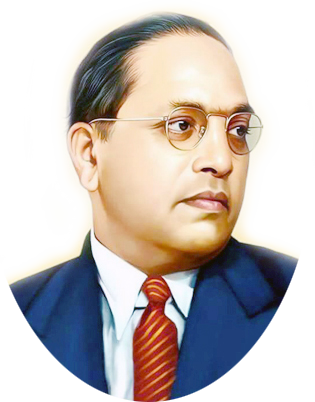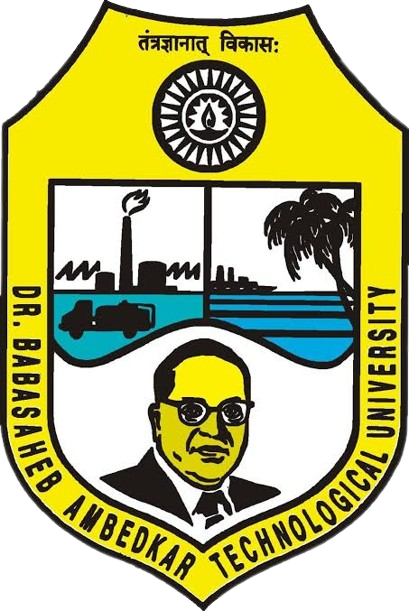About Us
Dr. Babasaheb Ambedkar Technological University, with its headquarters situated at Lonere, is now a statutory State Technical University established by Government of Maharashtra through special Dr. Babasaheb Ambedkar Technological University Act. The university has been accorded the status of an ‘affiliating’ university of the entire State of Maharashtra from March 2, 2016, by the Maharashtra Act No. XXIX of 2014.
Learning gives creativity, creativity leads to thinking,
thinking provides knowledge, knowledge makes you great.
Albert Einstein
Scientist
Vision
Mission
University
The University is committed to becoming a leading ‘Center of Excellence’ in the field of Engineering, Technology and Science as a seat of learning with a national character and international outlook.
The University is committed to provide quality technical education, research and development services to meet the needs of industry, business, service sector and the society, at large.
Computer Department
The department is committed to achieving academic excellence through education and research in the emerging and established areas of computer science and engineering.
Building the capacities of young students to realize their professional and academic dreams.
0
+
Faculty
0
+
Students
- Department Goal
Our goal is to provide state of the art courses in Computer Science and Engineering discipline.

- Implementation of Institutional Development Plan
- Implementation of Institutional Reforms
- Administrative, Financial and Managerial Efficiency Improvements
- Qualitative Improvements related to Education and Research
- Performance in Institutional Governance
- Support to Weak Students
1. Implementation of Institutional Development Plan
As envisaged in IDP, following activities have been carried out till date:
- The University introduced choice-based credit system from the academic year 2010-11.
- Academic systems such as credit-based continuous assessment system, non-negotiable academic calendar, transparency in the evaluation, etc. have been put in place.
- A two-fold increase in enrolment of M.Tech. programmes have been achieved due to the grant of assistantship to non-GATE M.Tech. students and 29 PhDs were given research assistantship in TEQIP-II which concluded in March 2017
- A large number of need-based training and continuing education programmes in subject domains and in pedagogy (basic module and advanced module) have been conducted for the benefit of internal as well as engineering teachers from other Institutes.
- Workshops on outcome-based education have been conducted for faculty.
- Nneed-based training programmes and workshops have been conducted for technical and supporting staff of the University so as to boost their morale and enhance the level of their motivation.
- Finishing school activity for SC/ST/OBC and academically weak students were conducted so as to improve their transition rate, pass rate, skills and employability.
- Several research labs, library and learning resources have been augmented and strengthened with TEQIP-II support.
- The industry-institute meet has been organised for collaborative activities
2. Implementation of Institutional Reforms
- Strategic Planning: The university has prepared an elaborate ‘Strategic Plan’ which gives a detailed roadmap for the long-term development and growth of the university as envisaged in the University Act. The implementation of this strategic plan in letter and spirit will enable this university to achieve its goals.
- The curricula have been completely revamped in the year 2016-17. The same will be applicable to all affiliated colleges.
- Academic systems such as credit-based continuous assessment system, non-negotiable academic calendar, transparency in the evaluation, digital evaluation, etc. have been put in place.
- Quality Assurance: An “Institutional Quality Assurance Cell (IQAC)” has been put in place. This cell monitors the quality of all academic and administrative activities on a regular basis so as to achieve continuous quality improvement. This cell also ensures that each department conducts the periodical academic audit as per UGC guidelines. In addition, the university has designed formats and processes for carrying out a rigorous academic audit of its affiliated colleges.
- In addition, each academic department has ‘Departmental Committee’ comprising of HoD, all faculty members, representatives of non-teaching staff and students’ representatives (UG/PG/PhD). The department functions through this committee and through its 12 different sub-committees responsible for effective administration. Further, as a new initiative, each academic department has an ‘Advisory Committee’ of HoD, one senior professor, three senior professors from other reputed institutes and three experts from industry. Thus, the department follows the participative and objective approach in taking decisions useful for the department. It is expected that each affiliated college will follow good practices started by the University
- Extensive Usage of ICT in Administration, Governance and Academic Activities: Nowadays, the use of ICT has become inevitable for enhancement of productivity and quality of education. Maximum possible use of ICT in administration, governance and academic activities would not be possible unless there is there is a full-fledged and full-time expert in the top management who will look after this activity. In view of this, a post of Director (ICT) will be created as shown the organisational chart. An ERP system for this purpose is being developed. In the meantime, the university has already put in place an online attendance system and a unique and first-of-its-kind online admission and monitoring system for PhD candidates.
- In a recent JBVC meeting of the Vice-Chancellors of universities in Maharashtra, it has been decided to deploy the PMSS system of TEQIP, after due customization, for regular procurement activities of the university. The minutes of this JBVC meeting are awaited. Once the minutes of JBVC meeting are received, steps will be taken for its implementation.
- Transparency and Accountability: The university strongly believes in transparency and accountability as the cornerstones of good governance. Towards this end, the university has decided to make all important documents available in public domain through its website. The documents such as Strategic Plan, Self-Assessment Report, Audit Reports, Annual Reports, Evaluation Reports of regulatory bodies like NBA/NAAC, minutes of meetings of various authorities/committees, etc. will be uploaded on the university portal from time to time. Every year, the university prepares an elaborate ‘Annual report’ and submits it to the State Government; which is later placed in the monsoon assembly of Legislative Assembly and Legislative Council. Further, ‘whistle blowing mechanism’, grievance redressal mechanism and an ‘ombudsman’ are also being put in place.
3. Administrative, Financial and Managerial Efficiency Improvements
- As a result of the implementation of various reforms mentioned above, the efficiency of various academic, administrative and financial activities has improved. For most of the reforms, detailed manuals have been prepared and circulated. Due to these reforms, the processes have become user-friendly and hassle-free. For instance, as a result of online admission and monitoring system for PhD candidates, which is unique and first-of-its-kind in the country, the PhD admissions and monitoring the progress of PhD candidates till the award of the PhD degree has become fool-proof and efficient.
4. Qualitative Improvements related to Education and Research
- Due to the implementation of academic reforms as mentioned above, the teaching-learning process has undergone significant improvement.
- Learning beyond the classroom: The University provides funding support to technical festivals and professional chapter activities of the students so that they learn many new things on their own. The positive outcome of this initiative will be visible soon.
- Through TEQIP, we took a policy decision to support research-oriented projects of final year UG students. As a result, the number of UG research projects has significantly risen. Moreover, due to the excitement of doing research projects, some of these UG students have joined Masters’ programs and PhD programs.
- It is mandatory for every PhD student to publish at least one research paper in the reputed international journal having an impact factor of at least 1.0. This mandate has resulted in significant improvement in the quality of their research work. Moreover, it has brought in a change in the research culture in the university.
- Several workshops have been conducted on ‘Research Methodology’ for the benefit of PhD/MTech students and given them guidelines for doing good research work and writing good research papers. These workshops have paid rich dividends.
- Several of University faculty members are being invited by other institutes to deliver expert talks in their subject domains and also on topics like OBS, pedagogy, research methodology, etc.
- MoUs have been signed with reputed industries like BOSCH, GESKON (Norway), and Tata Technologies Ltd. for the conduct of training programmes for faculty and students.
5. Performance in Institutional Governance
The University believes that ‘good governance’ is the key to achieving its goals. In view of this, the university has made several reforms gradually in governance practices. The following are some of the ‘Best Governance Practices’ that the university has put already in practice and several others are in the process of implementation.
- The university has well-structured governing mechanisms as provided in the University Act No. XXIX of 2014. The governance and administration of the university are carried out through various committees. To name a few, the following are the main committees of the University:
- Executive Council
- Academic Council
- Planning & Monitoring (Evaluation) Board
- Finance Committee
- Board of Examinations
- Boards of Studies
- Library Committee
- Infrastructure Development & Building & Works Committee
- Purchase & Sales Committee
- Grievance Committee
- Library Committee
- Standing Committee for Administration
In order to achieve inclusive governance and all-round growth of the University, the above committees have appropriate representation of various stakeholders, i.e. faculty, staff, students, alumni and industry. For each of these Committees, a manual has been prepared to list the statutory composition, details of the members indicating their qualifications for being on the Committee and their interest, powers and responsibilities of committee and its members, the mechanism of the conduct of the meetings and methodologies of maintaining the documentation of the related papers. It has been decided to make minutes to be available for all stakeholders of the University on the intranet.
The documentations have been made for the composition of every statutory committee of the University, the functions and qualifications of the officers of the University and their selection processes, their powers and responsibilities. The University is keen to openness in its Governance.
- Organisational Structure of the University is as per the chart is given below.
As shown in the organisational chart, the University is laying special emphasis on training of teachers and curriculum development by having a dedicated “Centre for Curriculum Development and Teachers and Staff’ Training” along with its Regional Sub-centres. It is envisaged that each newly appointed teacher in the university or its affiliated colleges will have to mandatorily undergo intensive ‘pedagogical and motivational training’ right at the beginning of his teaching career. Further, an adequate delegation of authority and empowerment of the officers of the university are given due importance.
The University is setting up it’s regional and sub-regional centres which will be autonomous in their administration, with decentralised functioning.
6. Support to Weak Students
- Several finishing school activities and soft-skill development programmes were conducted for SC/ST/OBC and academically weak students so as to improve their transition rate, pass rate, skills and employability.
- In the last 5 years, remedial coaching classes are being conducted on a regular basis for the benefit of weak students in each semester.
- A specially designed ‘diagnostic test’ is being conducted for new entrants so as to identify weaknesses in each of the students. Accordingly, suitable measures can be taken in future to help the students to address these weaknesses and improve their academic performance and personality.

